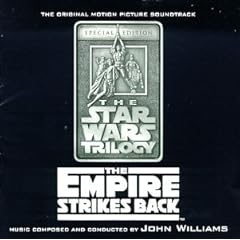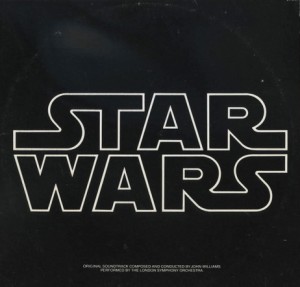Hiya, kids! This week’s mix is brought to you by Jeff Johnson, who’s been a friend of mine since high school. Ever since I’ve known him, Jeff’s tastes in music have skewed toward the soundtrack side, specifically orchestral soundtracks. We attended film school together (I changed majors at the end of my junior year), and he went on to write and direct a feature film called Holly vs. Hollywood. Nowadays Jeff is happily ensconced as the online store manager at the ever-popular soundtrack store (and record label) Intrada in Oakland, California. Intrada is one of those rare record stores where they not only exclusively stock movie soundtracks, they also restore and reissue them. Jeff also cohosts the podcast Filmed, Not Stirred with his gal pal Lisa. It’s unique because they review a new movie and compare it with an older movie in a similar genre or director. So you see? There is life after film school! –Ted
You’re about to discover six pieces of music you’re not even really supposed to notice. So what is it about film-music geeks that makes it virtually impossible for them to watch a film without noticing its music? And even more curious, why would they want to listen to it on its own?
In coming up with this list of my favorite soundtrack cues, two things are obvious: 1) all the pieces are composed by either Jerry Goldsmith or John Williams, and 2) they were all composed between 1976 and 1982. I don’t know what that means, except to say that I discovered all of them when I was between the ages of 11 and 17. I had them all on vinyl and played them so many times as a kid that I wore out the records. These aren’t necessarily the best pieces of film music, but they are some of my favorites.
“Ave Satani,” Jerry Goldsmith (fromÁ‚ The Omen) (download)
We’ll let Mr. Goldsmith kick things off with a piece of film music that got me started collecting soundtracks! The Omen, directed by Richard Donner, was released in ’76, but I wasn’t allowed to see it until the following year. See, we had just gotten this channel called Showtime, and back then they only showed two movies a night. I started watching The Omen one night at 10:00, and from theÁ‚ first bars of Goldsmith’s main title, I was hooked.Á‚ It was a revelation, a life-changing experience.Á‚ This, to my 11-year-old ears, was music; if I possessed the skills to compose, the Omen score is what it would sound like. I can only imagine what my parents must have thought, hearing “Ave Satani” emanating from their only child’s room again and again.
Goldsmith, who died in 2004, won his only Oscar for this score, and “Ave Satani” was actually nominated for Best Song that year — but it lost to Barbara Streisand and Paul Williams’s “Evergreen,” from A Star Is Born.
“Prelude and Main Title March,” John Williams (from Superman) (download)
Simply one of the best opening-credits sequences of all time — Superman was Richard Donner’s follow-up toÁ‚ The Omen –Á‚ and after hearing John Williams’s “Prelude and Title March,” you’re ready for anything. You will believe Krypton is real and Marlon Brando isÁ‚ Superman’s dad, and as the tagline promises, you will believe a man can fly. Williams and the London Symphony Orchestra masterfully set the tone. (Donner originally asked Goldsmith to compose the film’s score, but a scheduling conflict prevented him from taking the assignment, allowing Williams to step in.)
On the 1978 soundtrack album this piece was called “Theme From Superman” and was edited differently, but on subsequent reissues it was restored to include the wonderful prelude music that plays over the film’s stylizedÁ‚ Daily Planet intro, not to mention the slow build to the iconic 6/8 main-title rhythm.
“Break Out,” Jerry Goldsmith (from Capricorn One) (download)
For a long time in the circle of film composers, Goldsmith’s “Break Out,” from Peter Hyams‘s Capricorn One, was the standard by which all other action-movie music was measured. Many film-music geeks, myself included, think this is quite possibly the best piece of action music ever composed.
The version of “Break Out” featured here is the 1978 soundtrack-album arrangement, which removed some suspense and concentrated solely on the action. On a side note, the original soundtrack — i.e. the music cues you hear in the film, as opposed to the arrangements on the 1978 album — was finally released on the Intrada label in 2005, though it’s long out of print at this point. But no matter which version you hear, it all comes down to the climax, in which the entire French-horn section plays up and down the scale like a wailing siren.

“The Asteroid Field,” John Williams (from The Empire Strikes Back) (download)
From Irvin Kershner’s 1980 sequel to Star Wars, a fun, rousing, energetic piece that provides the perfect (yes, perfect) soundtrack for successfully navigating an asteroid field. (“Sir, the possibility of successfully navigating an asteroidÁ‚ field is approximately three thousand seven hundred and twenty to one!” “Never tell me the odds!”)
“The Battle of Yavin,” John Williams (from Star Wars) (download)
First off, let’s not have any of this Star Wars: Episode IV — A New Hope bullshit. Like I said in the previous entry, the name of George Lucas’s 1977 blockbuster is Star Wars, plain and simple.
John Williams’s Oscar-winning score is considered by many to be the work that made symphonic scoring “cool” again. Of course, it didn’t hurt to have a soundtrack album that was number one on the pop charts. On the original two-LP set, “The Battle of Yavin” was called “The Last Battle” and had a different edit, but the soundtrack’s 1997 reissue restored the “Launch From the Fourth Moon” section that had previously been missing. It’s also on the 2004 reissue. Seriously, folks, the Star Wars movies’ scores — just like the movies themselves — have been issued, reissued, repackaged, and remastered so many times I’ve lost count myself. All I know is that I’ve bought them so many times already, the next time it comes out I should get a free one.

“Adventure on Earth,” John Williams (from E.T. the Extra-Terrestrial) (download)
John Williams gets the final word with one of the finest examples of film scoring ever, from Steven Spielberg’s 1982 sci-fi tearjerker. Subsequent reissues of theÁ‚ E.T. soundtrack haveÁ‚ retitled this piece, rather lamely, as “Escape/Chase/Saying Goodbye,” but to me it’ll always be “Adventure on Earth.”
During the E.T. recording sessions, Williams reportedly had considerable difficulty with “Adventure on Earth,” because there were so many points where it needed to synch up just right with the images on the screen. One take would hit all the right marks but be lacking somewhat in performance, while another take would have all the emotion but miss some of the marks. Spielberg, sensing his friend and colleague’s frustration, then asked Williams to record the piece “wild,” or without visuals, and promised to recut the finale to match the music. It’s no wonder these two have enjoyed such an enduring collaboration, beginning withÁ‚ The Sugarland Express, Spielberg’s first feature film,Á‚ in 1974.









Comments